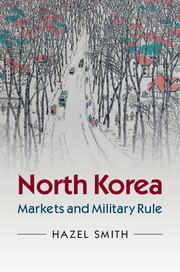Book contents
- Frontmatter
- Dedication
- Contents
- Acknowledgements
- Introduction: North Korea: politics, economy and society
- Part I Jettisoning caricatures: understanding history
- Part II The rise and fall of Kim Il Sungism
- Part III Marketisation and military rule
- 9 Marketisation from below
- 10 Military rule from above
- 11 The marketisation of well-being
- 12 The marketisation of the social structure
- 13 Going nuclear
- 14 Strategic paralysis
- 15 North Koreans as agents of change
- Bibliography
- Index
14 - Strategic paralysis
from Part III - Marketisation and military rule
Published online by Cambridge University Press: 05 May 2015
- Frontmatter
- Dedication
- Contents
- Acknowledgements
- Introduction: North Korea: politics, economy and society
- Part I Jettisoning caricatures: understanding history
- Part II The rise and fall of Kim Il Sungism
- Part III Marketisation and military rule
- 9 Marketisation from below
- 10 Military rule from above
- 11 The marketisation of well-being
- 12 The marketisation of the social structure
- 13 Going nuclear
- 14 Strategic paralysis
- 15 North Koreans as agents of change
- Bibliography
- Index
Summary
The United States, Japan, much of the rest of the world and a significant part of the population of South Korea viewed North Korea as constituting a threat to international security because of its very nature as an aggressor state, variously termed ‘rogue', ‘outlier' or just plain ‘mad'. From this perspective, the threat was magnified exponentially by North Korea's possession of weapons of mass destruction, including nuclear armaments. China and Russia did not share the rogue state perspective on North Korea, but they did not support North Korea's nuclear weapons programme.
The United States government was understood by allies and adversaries as the necessary leader of global negotiations with North Korea given the historic, unresolved conflict between the two states and the dominant position of the United States in East Asia. East Asia was important for United States governments but after 9/11 and the ensuing ‘war against terror' security priorities initially shifted to the Middle East and United States policy concentrated its efforts on securing alliance structures, most notably with Japan, and focused on managing complicated relations with China, its economic partner and erstwhile political adversary. United States policy became one of containment as, other international priorities, combined with domestic political opposition to offering North Korea inducements, precluded radical initiatives to resolve the Korean conflict. After the United States and the DPRK came close to war in June 1994, military force was never again considered a viable policy instrument because of the fear of damaging retaliation against Seoul. United States administrations were left with few negotiating instruments other than economic sanctions and the strategic calibration of humanitarian assistance programmes to support diplomacy.
The two-term administration of President Obama developed a policy of ‘strategic patience' and called for China to do more to encourage the DPRK to denuclearise. International organisations, states and campaigning non-governmental organisations (NGOs) supported the call for North Korea's denuclearisation and campaigned for human rights reform in North Korea.
- Type
- Chapter
- Information
- North KoreaMarkets and Military Rule, pp. 312 - 326Publisher: Cambridge University PressPrint publication year: 2015



